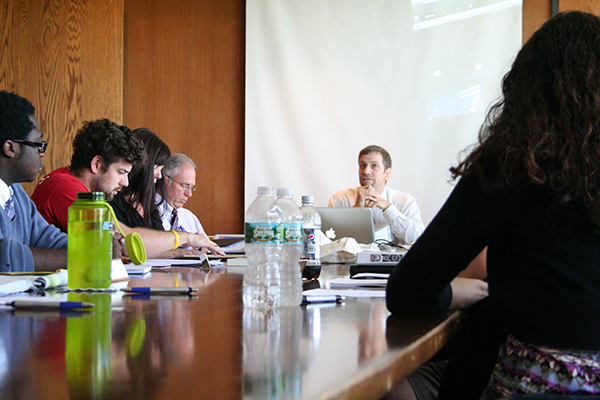
After weeks of discussion and debate, the Campus Auxiliary Services (CAS) board voted not to increase its student representation.
In light of the Request For Proposal (RFP) draft for future prospective food service providers being constructed by CAS and an outside consultant, student senators had hoped to add an additional two members to the board -which would boost student representation to the maximum 50 percent allotment in order to ensure student desires were included in the RFP.
After a motion for the additional members to be added to the board was tabled for discussion at the CAS board meeting on Sept. 12, the board discussed the proposal set forth by student Sen. Roberto LoBianco for approximately twenty minutes before ultimately voting down the motion at their most recent meeting on Sept. 19.
“It would need a majority vote, it did not get a majority,” LoBianco said.
The board’s vote was split between the students on the board who voted in favor, while members of the faculty, staff and administration voted against the proposal, according to LoBianco.
LoBianco said he hoped to get more students on the board in order to ensure that student desires were clearly outlined in the draft that is scheduled to be sent out to potential food service providers within the next few weeks.
“Students are required to have a meal plan; it’s mandated by the administration,” LoBianco said. “I think if you mandate that, students should have the largest voice on the board to determine what food they are eating.”
Steve Deutsch, executive director of CAS, said those at the meeting who voted against the proposal to add student representatives to the board had varying reasons for doing so.
“The faculty felt their vote would become diluted and administrators felt for a number of reasons that students were well-represented and more students on the board wouldn’t increase the quality of student representation,” Deutsch said.
Two members of the board, Helpdesk Coordinator Kevin Saunders and Vice President of Enrollment Management L. David Eaton, spoke of their unease toward voting in favor of the motion, citing fears of a tip balance in the various voting constituencies.
“I feel that if students got two more spots then the faculty voice would be too soft on the board like this,” Saunders said at the Sept. 19 meeting. “If students were able to get those positions…I have to protect the interest of the faculty here.”
Eaton had similar concerns and said he felt the board’s configuration provided equilibrium as it currently stands.
“The way it is configured now, [the board] has served a long period of time, prohibiting the hijacking of the board by any particular interest group,” Eaton said at the meeting on Sept. 19.
LoBianco, who was appointed by the senate to sit on the CAS board, said students were upset that the motion did not receive the required votes, but will continue to push for the desires students outlined in the survey sent out by Envision Strategies last semester.
“The students who were at the meetings were disheartened by the process,” LoBianco said. “I think it will be a challenge in balancing the concerns of the administration in regards to the cost of the food plan and balancing the issue of wanting to see a push toward local sustainable options for food.”
Despite students not receiving the additional seats on the board, both Deutsch and LoBianco said the board will work toward putting language in the RFP that highlights the desires outlined by students in the Envision Strategies survey.
Moving forward, LoBianco said it is not too late for students to speak their mind about what food they would like to haves, as it will affect future generations of students who eat on the New Paltz campus.
“People concerned about these issues should speak up now,” LoBianco said. “This contract will last five years, so it won’t be me or the students graduating after this year…it’s really about providing students with quality food on campus.”

